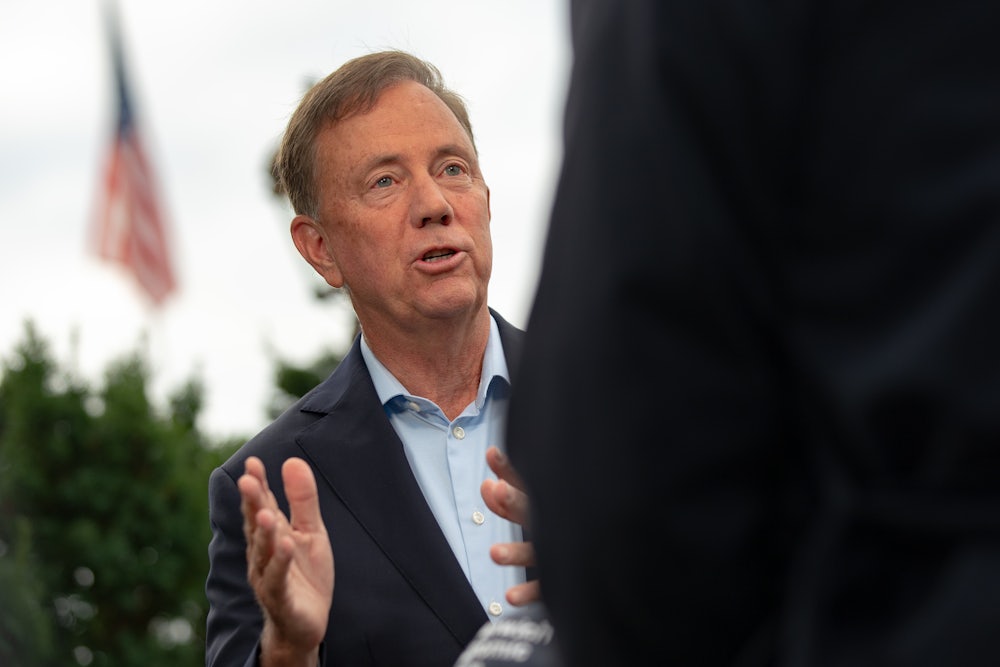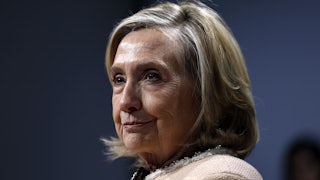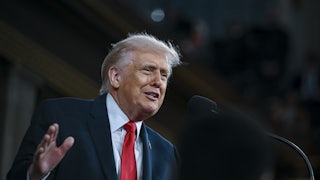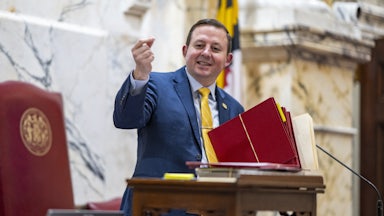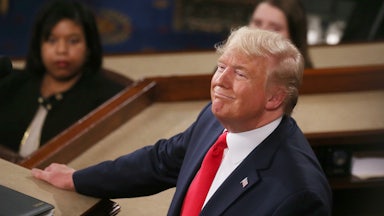This week, two Democratic governors chose starkly different paths on workers’ rights. On Tuesday, Oregon Governor Tina Kotek signed a bill allowing striking workers to receive unemployment benefits, like others temporarily out of work. On Monday, Connecticut Governor Ned Lamont vetoed a similar bill in his state, for the second year in a row.
One chose to stand with workers; the other turned his back.
Democrats have faced similar choices for years, and too many have forgotten the party’s central values, eager to prove their pro-business bona fides by throwing workers under the bus. Yet now, the context is different, and the stakes are far higher. The Trump administration is taking a bat to the federal government and to worker protections, leveling guardrails against business wrongdoing. It’s a “Which side are you on?” moment in which every Democrat should unambiguously fight for workers every time they have the chance.
President Trump and his team harmed workers 100 ways just in the first 100 days, according to the Economic Policy Institute. Some top-line items: He’s endangered workers’ lives by seeking to close offices of the Occupational Safety and Health Administration, which enforces workplace safety laws, and by functionally shutting down the National Institute for Occupational Safety and Health, or NIOSH, which researches prevention of workplace injury and illness. He stripped collective bargaining rights of more than one million federal employees, and essentially shut down the Federal Mediation and Conciliation Services, which helps workers and employers avoid strikes. And of course, he has illegally fired hundreds of thousands of public servants.
It was in this climate that Lamont vetoed the pro-worker bill. And he isn’t the only one. Colorado Democratic Governor Jared Polis vetoed a measure that would have eased the process of forming and joining unions in his state, even after five former Democratic labor secretaries urged him to sign it. His veto leaves in place an arcane, unique-to-Colorado requirement that a union must win 75 percent of votes in a second union election before being able to collect dues from all covered workers. This obstacle is likely responsible for Colorado’s unusually low union density.
Another Democrat, Maine Governor Janet Mills, vetoed pro-worker bills three years in a row: a labor whistleblower bill in 2021, a bill to provide farmworkers with collective bargaining rights in 2022, and even a minimum wage for farmworkers in 2023, a move that state labor leaders called “embarrassing and shameful.” This year, she finally relented, signing a farmworker minimum-wage bill—but only after removal of a section allowing workers to file their own wage theft claims in court, rather than relying only on the government to take action.
Several so-called moderate Democrats in the Minnesota legislature supported efforts (ultimately unsuccessful) to significantly roll back paid sick leave protections. And Washington, D.C., Mayor Muriel Bowser and several allies on the District Council are working to repeal wage protections for tipped workers that District voters overwhelmingly enacted by ballot initiative.
Neglect, too, is a policy decision. As a former New York labor enforcer, here’s my personal bugaboo: seeing Democratic district attorneys and other prosecutors building crack teams to prosecute retail theft, while leaving victims of wage theft with slim-to-no support. In contrast, some elected Democrats, like Minnesota Attorney General Keith Ellison and Manhattan District Attorney Alvin Bragg, created dedicated teams in their offices to enforce workers’ rights.
Working people are currently under extraordinary pressure from inflation, the housing crisis, health care costs, and more. Nearly 40 percent of people in an annual Federal Reserve survey said they couldn’t afford a $400 unexpected expense without borrowing money or selling something. People in Colorado working full-time jobs must show proof of employment in order to sleep in their cars in a parking lot near high-end ski resorts. Workers in America experience wage theft, extreme heat, discrimination, and stagnant wages; few have job security, yet many are bound by noncompete provisions preventing them from leaving for something better. On the merits, supporting workers is critical, both as a matter of values and big-picture economic well-being. Good jobs are the foundation of a strong middle class, which is essential to a stable economy.
To be sure, we need a hospitable business environment that promotes economic dynamism. But standing with workers is consistent with that goal: President George W. Bush’s first Treasury Secretary Paul O’Neill famously focused on safety when he led the industrial giant Alcoa. And enforcement helps create a fair market: otherwise, scofflaws who cheat their workers get an unfair advantage over competitors that follow the law.
When so many people are struggling to afford basic necessities, cozying up to insatiable mega-corporations seems strategically unwise. It’s also not likely to succeed: Do Democrats really think they’ll out-corporate the Republican Party?
In the end, unambiguous support for workers is also good politics. Worker issues resonate broadly across the aisle, and voters in red states repeatedly approve ballot measures to raise minimum wages, enact paid sick leave, and more.
The labor movement, even with numbers reduced in recent decades, is still one of the country’s largest civil society institutions, with 16 million members nationwide and historic levels of popularity among the public. A populist approach, including strong backing of workers, may lose Democrats some current supporters (in the words of Connecticut Senator Chris Murphy, “a handful of voters in Greenwich, Conn.”), but the electoral upside is huge.
If leaders like Lamont, Polis, and Mills aren’t there for workers, someone else will be, or at least will pretend to be. A new strain in the Republican Party clearly sees the opportunity: Missouri Senator Josh Hawley recently called for his party to “start delivering on America’s promise for America’s working people.”
Of course, high-information constituents will know that Republicans are cosplaying. Candidate Trump donning a hard hat or working at McDonalds for about 15 minutes is Exhibit A of this phenomenon. But if Democrats don’t support workers even when there might be some blowback, most voters won’t see a difference. The choice will be cosplay versus cosplay, and the country will be left without a party that truly defends working people.
The Democratic Party will never win back power—or build a better world—by siding with corporate behemoths. While an intraparty debate rages about whether the path forward lies with seeking abundance or fighting oligarchy, a reliable North Star that does both is right before our eyes. It’s kind of like Dorothy’s ruby slippers, or an overlooked old high school sweetheart—it’s been there all along. Take a side. Choose David, not Goliath. Stand up for workers, each and every time.
